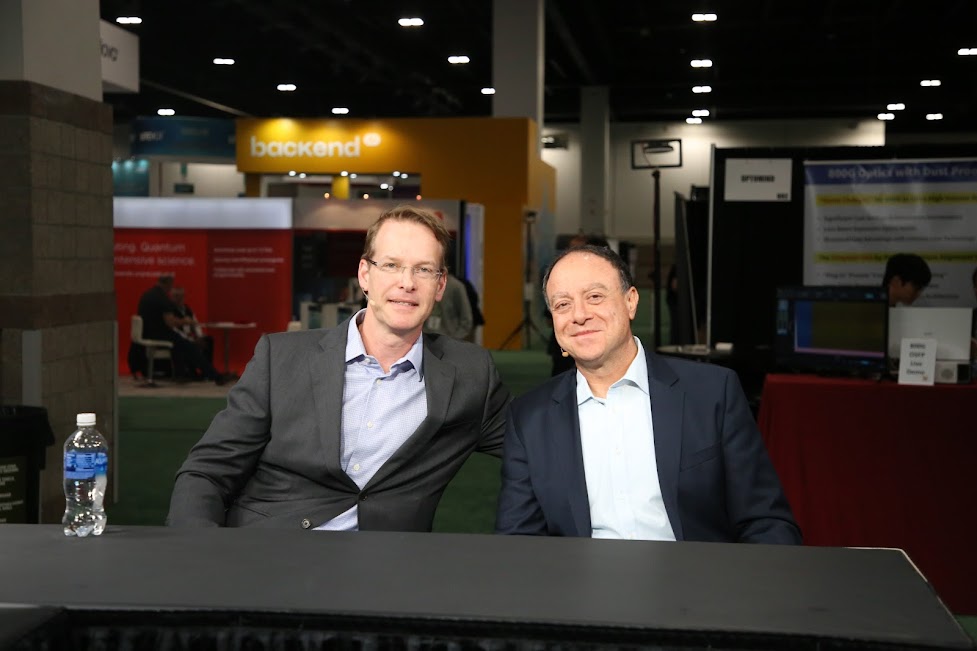 AI
AI
 AI
AI
 AI
AI
When high-performance computing industry experts gathered at SC22 last year, they were greeted with the introduction of the PowerEdge XE9680, the high-end AI training platform on display from Dell Technologies Inc.
One year later, Dell and its partner Broadcom Inc. are working on the next chapter for AI servers, which will address the performance of generative AI fabrics, modern architecture that automates data integration across platforms in real time. This involves being able to provide cluster-building solutions for inferencing that can overcome the connectivity bottleneck.
“We’re at the beginning of the long journey of optimizing the fabrics, the connectivity for the AI world,” said Ihab Tarazi (pictured, right), senior vice president and chief technology officer of Dell. “The speeds of connectivity and networking needed for generative AI are bigger than anything we have seen in networking, period. Not everybody expected this. Our work with Broadcom is essential to solve those issues.”
Tarazi spoke with theCUBE industry analysts Savannah Peterson and David Nicholson at SC23, during an exclusive broadcast on theCUBE, SiliconANGLE Media’s livestreaming studio. He was joined by Jas Tremblay (left), general manager for the data center solutions group at Broadcom, as they discussed how both companies are working together on new technologies for an AI-driven world. (* Disclosure below.)
Optimizing fabrics to support AI platforms will take innovative approaches and agreement on industry standards from key players such as Broadcom and Dell.
Broadcom has been an active proponent of the peripheral component interconnect express or PCIe interface standard for connecting high-speed components and has decided to take an open approach, according to Tremblay. The chip giant recently reaffirmed its commitment to the open compute community as part of its work toward an open hardware ecosystem for AI workloads.
“We believe the right answer is PCIe with Compute Express Link extensions,” Tremblay said. “We’ve decided this year to be completely open, non-NDA with a roadmap. It’s sharing the fabric roadmap with the entire industry, so they know what’s coming.”
One worrisome roadblock is cost. The power and performance of AI servers come at a price, a factor that Tremblay readily acknowledged.
“A compute server is in the $5,000 to $10,000 range,” Tremblay said. “The AI server is $200,000 to $250,000…and the power scales with cost. Those are real challenges for enterprises that have a fixed budget, and they want to be part of this.”
Despite the connectivity and financial concerns, AI remains a prime area of interest for many businesses. Customer interest in developing workable AI models is pushing major players such as Broadcom and Dell to move rapidly in finding enterprise solutions that will work.
“Necessity is the mother of invention here,” said Tarazi. “The reason we’re all working even faster together is we have these big super applications, which are generative AI models that people really like. At the end of the day, the fact that you’re going to get significant productivity benefits out of these generative AI models is what’s uniting everybody.”
Here’s the complete video interview, part of SiliconANGLE’s and theCUBE’s coverage of SC23:
(* Disclosure: Dell Technologies Inc. sponsored this segment of theCUBE. Neither Dell nor other sponsors have editorial control over content on theCUBE or SiliconANGLE.)
Support our mission to keep content open and free by engaging with theCUBE community. Join theCUBE’s Alumni Trust Network, where technology leaders connect, share intelligence and create opportunities.
Founded by tech visionaries John Furrier and Dave Vellante, SiliconANGLE Media has built a dynamic ecosystem of industry-leading digital media brands that reach 15+ million elite tech professionals. Our new proprietary theCUBE AI Video Cloud is breaking ground in audience interaction, leveraging theCUBEai.com neural network to help technology companies make data-driven decisions and stay at the forefront of industry conversations.